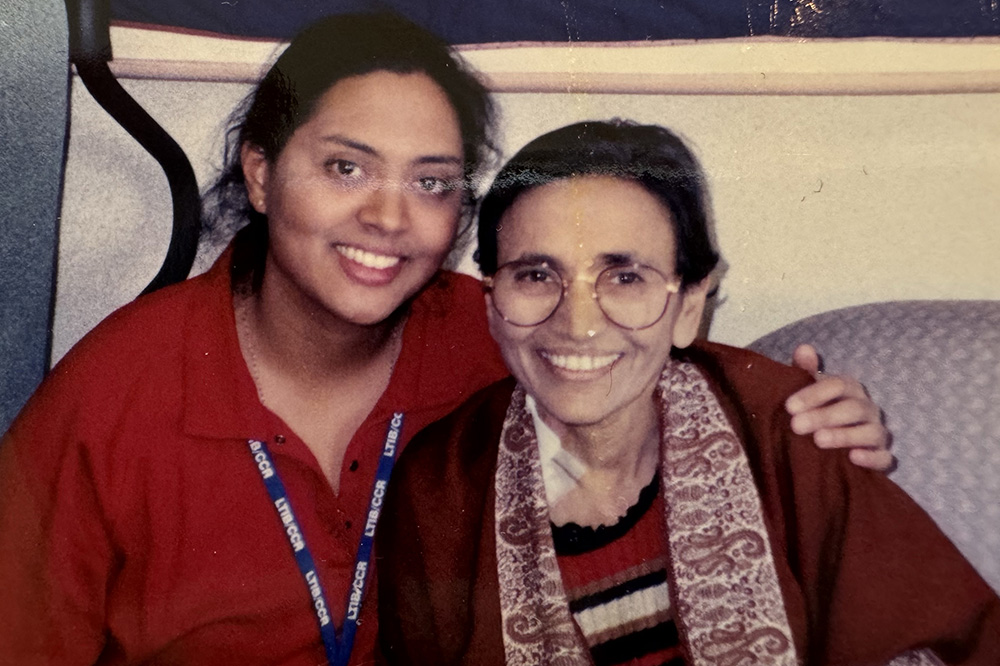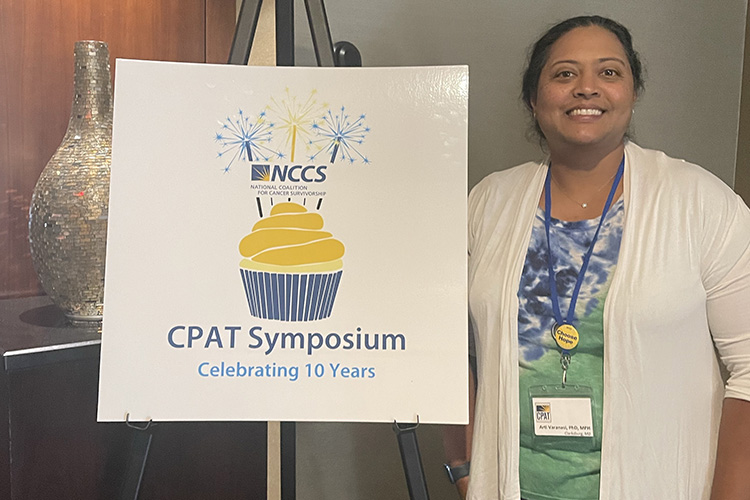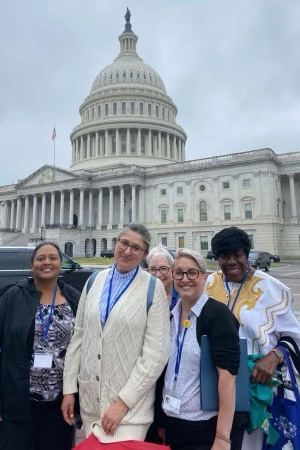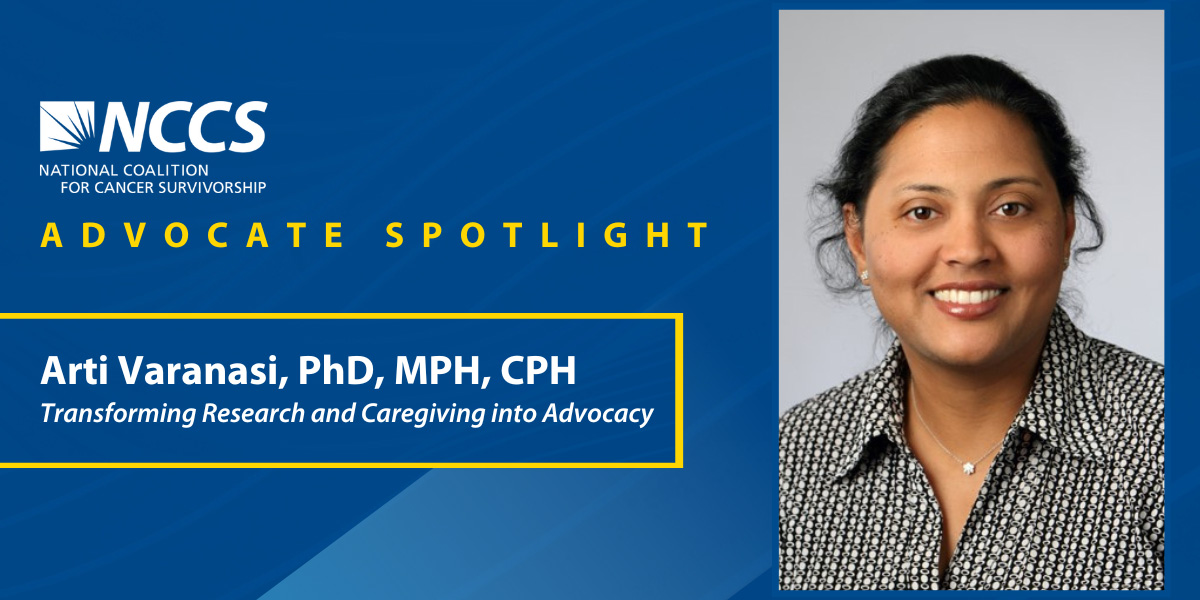Arti Varanasi – Transforming Research and Caregiving into Advocacy
Advocate Spotlight: Arti Varanasi, PhD
Arti Varanasi, PhD, MPH, CPH is the Founder, President and CEO of Advancing Synergy, a social enterprise focused on advancing health equity and health justice through innovations that engage individuals and impact communities. Driven by curiosity and purpose, she is most passionate about building community and capacity and ensuring individuals, organizations, and communities have access to existing information, care, and resources to support their growth and well-being.
Through Advancing Synergy, she has focused on supporting low-income women going through breast cancer treatment through technology and navigation support. Arti perpetually seeks ways to challenge herself to expand beyond her comfort zones and to be bold and brave in the face of new opportunities.
Her interest in cancer and cancer research began in high school with a science fair project that focused on using Ayurvedic medicines (traditional Indian medicines) to treat and cure cancer. This led her to continue a research path that culminated in a PhD in pathology and a master’s in public health. Her academic focus had always been understanding the underlying causes of cancer and how to treat and manage cancer. This all became very real when her maternal aunt was diagnosed with breast cancer.
Arti was in college when she first came face-to-face with the realities of cancer diagnosis and treatment. Arti’s aunt was diagnosed with stage 3 breast cancer and immediately scheduled for surgery, radiation, and chemotherapy. Although the prognosis was not optimal, her aunt was not going to let cancer change how she lived her life, and Arti was there to support her through it. Her aunt was the glue in their family and was always on hand to do anything for anyone. She thrived for many years after her initial diagnosis and treatment.

When her aunt was later diagnosed with recurrent metastatic breast cancer and enrolled in a clinical trial at the National Cancer Institute (NCI), Arti, who was just starting her postdoctoral fellowship at NCI, took on the role of caregiver. Arti’s aunt had been told by her local oncologist that there was nothing that they could do for her. She was not offered any treatment or palliative care. Nothing. That word “nothing” and the accompanying inaction was a significant barrier. Arti did not accept “nothing” as a response. Instead, she researched clinical trials at the NCI and connected with oncologists and researchers that she knew. When they learned her aunt could enroll in a clinical trial at the NCI, the pair immediately drove from North Carolina to Maryland. There, her aunt received top notch care, including palliative care and interventions and resources to support her quality of life.
Through this experience, Arti learned that it is critical to listen and learn as you support and advocate for your loved one. She also learned that, while caring for your loved one, you MUST care for yourself. Caregiving can weigh heavily on the caregiver, Arti remembers. “Often that weight is not felt until after the immediate caregiving roles stop. Be kind to yourself. Ask for help and support. Give yourself peace and grace” she says.
Actively involved in the cancer research and advocacy community since graduate school, Arti served with the American Association for Cancer Research (AACR) as part of their Associate Member Council and a mentor in the Scientist-Survivor Program. As a postdoctoral fellow at the National Cancer Institute, she helped found the Fellows and Young Investigators Association to help support and promote the professional development of scientists and researchers in cancer. Currently, she is a member of the Women in Cancer Research Council at AACR. She also serves as co-chair of the Workforce Development Task Group for the American Cancer Society National Navigation Roundtable (NNRT) and most recently was appointed to serve on the NNRT Steering Committee. She is also engaged in supporting and collaborating with The Janet Hall Foundation, a local foundation focused on uplifting underserved women diagnosed with breast cancer. Arti plays an active role in Maryland as part of the Maryland Cancer Collaborative and the Maryland Colorectal Cancer Task Force which are currently focused on increasing cancer screening.
“When I first learned about NCCS, I was immediately drawn to the organization. Finding NCCS, is like finding my home,” she says. “NCCS is a community of individuals who support each other with the goal of creating an environment that is increasingly accessible and supportive for all cancer survivors.” In 2022, Arti was selected to join the NCCS Elevating Survivorship program. Her project focused on developing and implementing tools and strategies for supporting the psychosocial needs of underserved cancer survivors. Arti’s enthusiasm for the topic is evident. “Despite significant advances in cancer treatment and care, psychosocial needs remain unmet among a considerable segment of cancer survivors,” she says. “These unmet psychosocial needs result in negative outcomes across the cancer trajectory. While mandates to address psychosocial distress have led to increased distress screening, they have not improved access to evidence-based psychosocial interventions, particularly among medically-underserved, low-income (MULI) individuals.” Arti intends to address these gaps in care through community engaged education and awareness efforts rooted in evidence-based interventions.


Arti on Capitol Hill with a group of advocates from Maryland on NCCS Hill Day.
Arti continues to be an engaged advocate. She shared her expertise about health equity with the 2023 Elevate cohort and is building on the work of her original Elevate project by engaging with survivors through her work with The Janet Hall Foundation. Arti took the opportunity to attend the 2023 CPAT Symposium. There, she says, “I had the opportunity to be immersed fully in cancer advocacy from soup to nuts. I have been part of Hill Days in the past, but CPAT was different. We came together as a family on mission who would stop at nothing to share our message and advocate for what is needed to improve the lives of all cancer survivors. CPAT empowered us to be prepared, confident, and effective advocates.”
Her advice for other caregivers interested in advocacy work: “Caregivers are a critical voice in policy work and advocacy. They get it. They have experienced the cancer journey alongside their loved ones and know firsthand how cancer impacts everyone. The caregiver voice and all voices matter in advocacy. Use your voice and get out of your comfort zone. You can and will make a difference.”
Learn more about NCCS’s Elevating Survivorship (“Elevate”) initiative, a training and mentorship program for patient advocates interested in improving survivorship care in their community. Learn more about Elevate »




